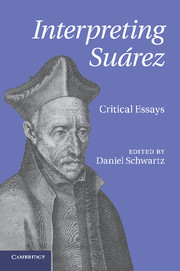Book contents
- Frontmatter
- Contents
- Notes on contributors
- Acknowledgements
- Abbreviations and method of citation
- Chapter 1 Introduction
- Chapter 2 Fundamentals in Suárez's metaphysics: transcendentals and categories
- Chapter 3 The reality of substantial form: Suárez, Metaphysical Disputations xv
- Chapter 4 Suárez on the ontology of relations
- Chapter 5 Suárez's cosmological argument for the existence of God
- Chapter 6 Action and freedom in Suárez's ethics
- Chapter 7 Obligation, rightness, and natural law: Suárez and some critics
- Chapter 8 Suárez on distributive justice
- Chapter 9 Suárez on just war
- Bibliography
- Index
Chapter 4 - Suárez on the ontology of relations
Published online by Cambridge University Press: 05 December 2011
- Frontmatter
- Contents
- Notes on contributors
- Acknowledgements
- Abbreviations and method of citation
- Chapter 1 Introduction
- Chapter 2 Fundamentals in Suárez's metaphysics: transcendentals and categories
- Chapter 3 The reality of substantial form: Suárez, Metaphysical Disputations xv
- Chapter 4 Suárez on the ontology of relations
- Chapter 5 Suárez's cosmological argument for the existence of God
- Chapter 6 Action and freedom in Suárez's ethics
- Chapter 7 Obligation, rightness, and natural law: Suárez and some critics
- Chapter 8 Suárez on distributive justice
- Chapter 9 Suárez on just war
- Bibliography
- Index
Summary
Relations are puzzling, particularly within ontologies of substances and properties. They bring together diverse entities, but where are they themselves to be found? Quasi-ubiquitously in several entities at once? If only in one of those entities, are the other entities to be found there also? But how can one entity be found in another if not as a property of it? Relations, as Leibniz famously puts it, appear to be absurd accidents present ‘in two subjects [at once], with one leg in one and the other in the other’. Indeed, his philosophy embodies a sustained effort to understand relations within an ontology of substances and inherent properties. It is not surprising that given their strange character, some have attempted to analyse them away and hold that they supervene on and amount to nothing more than the non-relational properties of things.
Several issues suggest themselves here. Supervenience is an ontologically weak, equivocal notion, and reductions come in many sizes and colours. Furthermore, a cursory look at relational facts reveals significantly different kinds. There are mere constructions of a mind which brings together two or more things that otherwise have nothing to relate them, at least prima facie. Then there are relations which though appearing to have an extra-mental reality, still seem to be nothing more than monadic properties in the relata, like being skinnier; while others also appear to be real and independent of the mind's conception but instead seem not to involve any properties, monadic or otherwise, actually in the relata, like being distant from. There are also some which at least intuitively and on first approach resist being thought away without some irreducibly relational residue remaining in the things so related, like motherhood and other instances of causation. Finally, there is thought, the subject of dispute regarding whether its relational character runs any deeper than the surface. It is not clear that all these kinds, which do not exhaust the range of apparent ontological diversity amongst relations, will submit to the same analysis.
- Type
- Chapter
- Information
- Interpreting SuárezCritical Essays, pp. 62 - 88Publisher: Cambridge University PressPrint publication year: 2011



